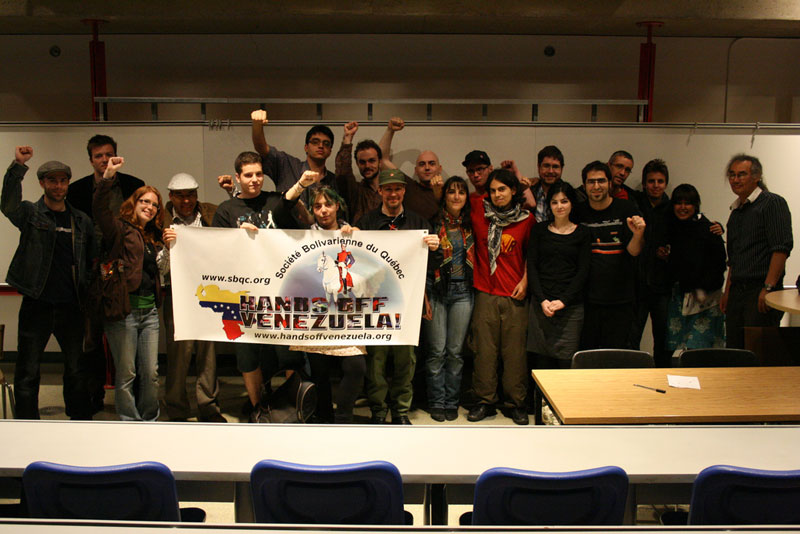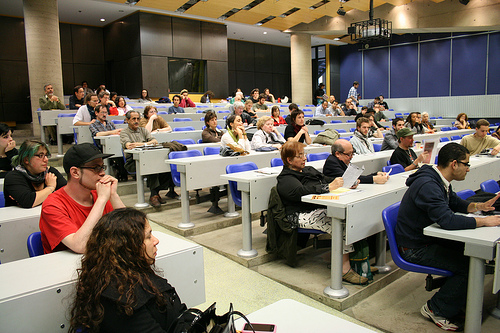On Thursday, the 4th of June, the Société Bolivarienne du Québec/Hands off Venezuela held a public conference on the subject “From Caracas to Montreal: Another World Is Possible.”
Read this article in French.
A little over a hundred people came to listen to, and debate with, panelists Jorge Martin, international secretary of the Hands off Venezuela campaign and member of the International Marxist Tendency, and Guillaume Hébert, coordinator of the alter-globalization commission of Québec solidaire, a young party founded to unite the left-wing movements in Quebec. The discussion centered on how the left in Quebec can learn from the Bolivarian revolution led by Hugo Chávez.
Martin began his comments with a brief reminder of history. Twenty years ago, with the fall of the Berlin wall, joyful right-wing ideologues and the global bourgeois class were hastily declaring the “fall of socialism.” In the same year, another major event took place, although almost nobody paid much attention in the mist of the celebration of the supposed victory of capitalism. This was the popular uprising against Venezuelan structural adjustment measures imposed by the International Monetary Fund, an event known as the “Caracazo.” This popular revolt called into question the very basis of capitalism: private property. The reaction of the Venezuelan bourgeoisie, with the tireless support of almost all major media in the world, was swift and cruel. Several thousand people lost their lives in the brutal repression that followed the rebellion.
However, for some analysts of Latin America, it was 1989 that marks the start of the Bolivarian Revolution. Martin emphasized the salient features of these events, namely, the direct participation of the people decided to take control over their own destiny.
The arrival of Hugo Chávez to the presidency in 1998 and fit into the chronology of the revolution as a logical continuation of the “Caracazo,” which is more accurately known as the “Sacudón” (the great shaking) because the population took to the streets not only in Caracas, but throughout the country.
This revolution has been threatened repeatedly, Martin reminded the audience, including during the coup d'état in April 2002 and the sabotage of the oil industry in 2002/2003, but every time it was saved by the direct intervention of revolutionary workers.
 Société Bolivarienne du Québec/Hands off Venezuela The occupation of factories and operation of production under worker control are clearly a step toward overcoming capitalism and building socialism, said Martin, for whom this means reconnecting with long-established traditions of workers around the world
Société Bolivarienne du Québec/Hands off Venezuela The occupation of factories and operation of production under worker control are clearly a step toward overcoming capitalism and building socialism, said Martin, for whom this means reconnecting with long-established traditions of workers around the world
The testimony of Paul-André Boucher, leader of the factory occupation in Saint-Jérôme, Quebec, in 1972, came to corroborate this assertion. The audience paid a moving tribute to the former labour leader.
For Guillaume Hébert, the influence of emancipation struggles in Latin America has been felt in Quebec since at least the Patriots’ War, which was largely inspired by the liberation movement of Simon Bolivar and his followers.
The Québec solidaire coordinator also said that Quebec in many respects deserves to be called Latin America North, having in common not only cultural influences, but also a history of colonial oppression characterized by the systematic looting of its natural resources.
More recently, according to Hébert, the struggle of the FLQ was also influenced by South American revolutionaries, including the Uruguayan Tupamaros movement, without forgetting, of course, the mark of the Cuban Revolution on the hearts and minds of all generations of activists since 1959.
The audience was not indifferent to the words of panelists. Many people enriched the discussions with comments and questions whose answers ultimately cannot be found in the framework of a symposium, but only through the emancipatory struggles in Quebec and across Canada.
We also wish to thank the following organizations for their support: the Public Service Alliance of Canada-Quebec (PSAC-Quebec), QPIRG-McGill, and the AÉÉDEM (Association of Graduate Students Employed at McGill).

